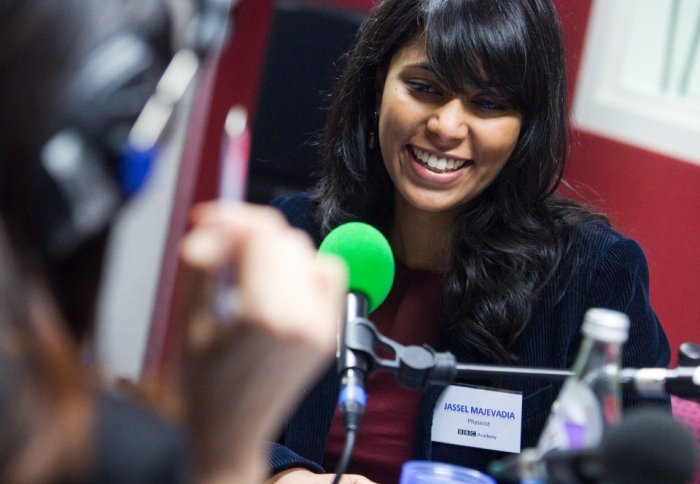CDT student attends BBC Academy training day for Female Experts
by Lucy Stagg

Science communication enthusiast Jassel Majevadia successfully secured a spot at the BBC Academy training day for Female Experts
This event, designed to address the lack of expert women who are willing to appear on screen and radio, welcomed 30 women from a wide range of disciplines, out of approximately 2,000 applicants. Jassel details her experience.
I have a confession to make.
My name is Jassel Majevadia, and I'm an impostor.
Or at least, I think I am.
Three times on three separate occasions in the last few weeks I have encountered this strange phenomenon, both widespread and yet commonly unrecognised: impostor syndrome.
Impostor syndrome is when you feel like the only fake in a world of real experts - and that one day, you will get caught. PhD students experience it all the time, feeling relieved that another day has gone by where they have managed to successfully convince their supervisors and peers that they actually know what they are doing. The phrase also featured in a book entitled "Chavs" by Owen Jones, in the context of scholarship winners from poorer backgrounds who feel that they do not deserve their clearly hard-earned successes.
Finally, it cropped up at the BBC, of all places! I was the lucky recipient of a place at the BBC Academy's Expert Women's day, where I was apparently classed amongst 30 incredibly talented women. Quietly hiding behind a cup of coffee I sat in the lecture room, wondering how on earth I had managed to blag my way in. And then it happened… I was outed. The plenary speaker, Daisy Goodwin, announced an interesting fact. Whilst more men happen to be in the media "diary" more often than women, when female experts are asked to contribute or comment to a topic, they a) do not consider themselves to be "expert enough", and b) attribute most of their successes to outside factors. In plain English - they consider themselves to be impostors.
Following this I could sense that I was not the only one in the room sighing with relief. It turns out that this is a huge problem in the media industry and no doubt everywhere else! Once this topic was settled, we were put at ease with the help of a brilliant "Women in the BBC" trailer which ended with the faces of the 30 participants, and then the day continued.
My group began with a radio discussion session, as live, in the style of "Start the Week". Listening to the playbacks of our in depth radio discussions I wasn't entirely sure whether it was really us, or professionals who had stepped in for us. The trainers, which included Liz Barclay of "You and Yours" made us feel incredibly at home. We then went on to film our walking "piece to camera", where we recorded two versions of "explain something complicated in one minute and keep it interesting the whole time". One version was as we had practiced, and the second was with the hamminess turned up to 11, which actually came across rather well and not too creepy on camera.
Lunch was splendid, or it would have been if there hadn't been about 70 amazing people there distracting me from my food. The who's who of the BBC and the wider broadcasting industry came along to have a chat with us - including a producer from the BBC World Service, the former and current editors of BBC Horizon and a producer from the Discovery Channel. Shortly before I had managed to munch on my sandwich a few of us were whisked away to meet a host of journalists, where we were able to detail a few of our experiences so far, as well as our hopes and expectations for the future, which for many included working with the media.
The third session of the day gave us the opportunity to talk with some of the top dogs themselves in a more intimate setting, which was also broadcast live on the BBC Academy website. Helen Hawken of the Discovery Channel, Jane Garvey of Women's Hour and the BBC's head of science Andrew Cohen were amongst the panel, offering a few tips on what to do and what not to do when working towards the media. Finally they saved the best till last, our "Now Show" interviews, where we were questioned on niche (but CDT friendly!) topics such as how scientists in a field such as materials might collaborate with say, medical professionals. Following a few um's and ash's I managed to overcome the fatigue from the long day, as well as my nerves, and finished up with a great interview experience.
To conclude, first BBC Academy event proved to be an invaluable experience which offered insight into the media that isn't often publicised. The Expert Women day will be followed up by another training day in March where I will meet 30 more talented women. The scheme is, in my opinion, a great way to introduce more women into the media and more importantly, to give them the confidence to just say "yes" when asked to appear on-screen or radio. Rather interestingly, since the training day, the topic of impostors has been discussed at great length on BBC Radio 4's "Feedback", as well as in Broadcast magazine's article "A showcase of female talent".
Feeling a lot less like an impostor, this is Jassel Majevadia, signing off for the TSM CDT news.

Article text (excluding photos or graphics) © Imperial College London.
Photos and graphics subject to third party copyright used with permission or © Imperial College London.
Reporter
Lucy Stagg
Faculty of Natural Sciences